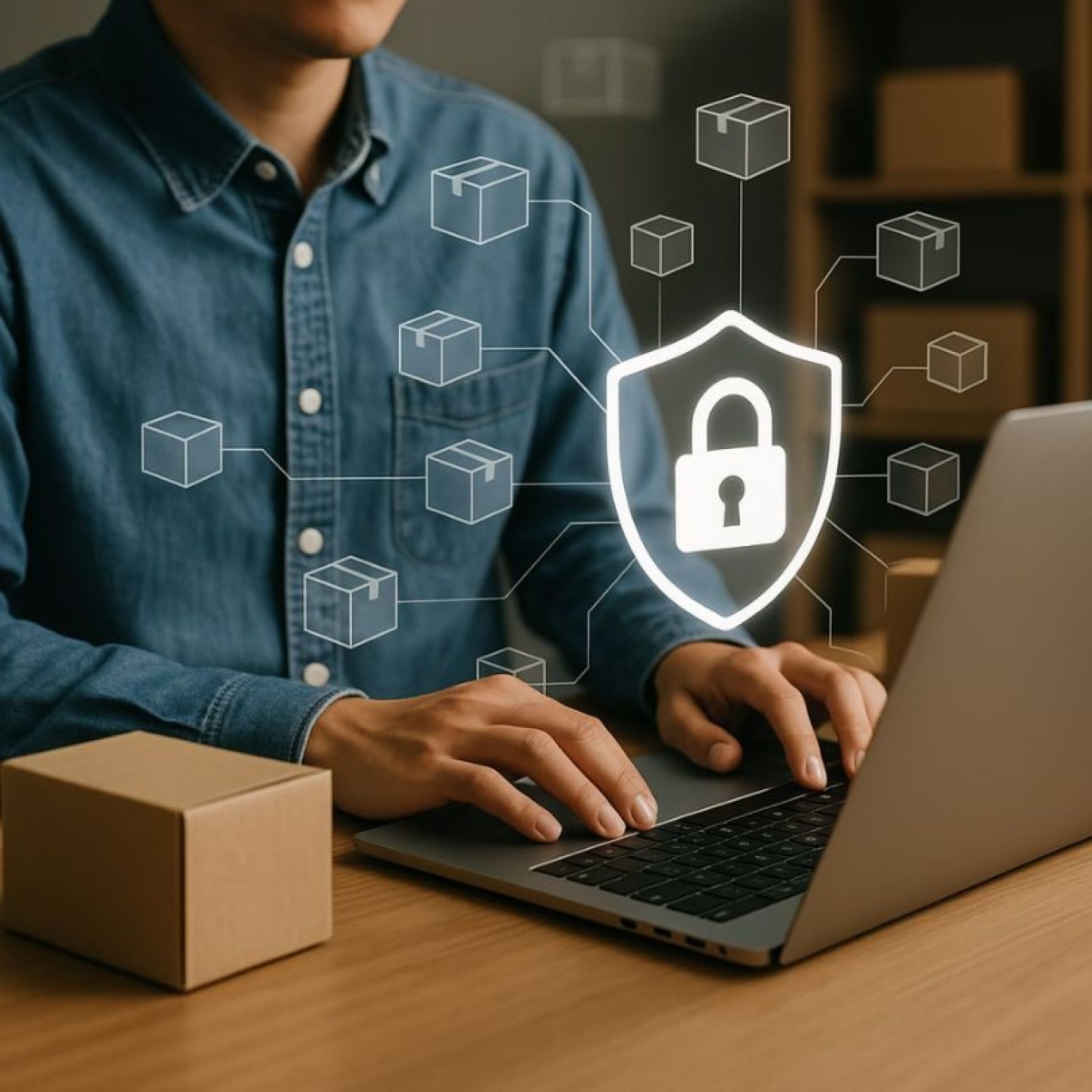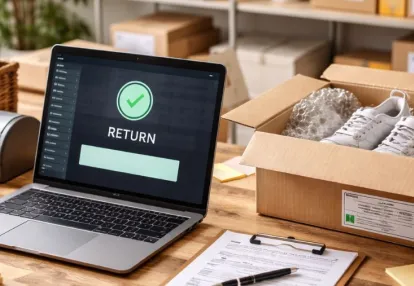
Наши инструменты отслеживают миллионы рекламных кампаний в форматах native, push, pop и TikTok.
НачатьДропшиппинг изменил электронную коммерцию, позволяя продавать товары без хранения запасов. Вы сотрудничаете с поставщиками, которые отправляют товары напрямую вашим клиентам, устраняя расходы на складирование и операционную сложность. Эта бизнес-модель продолжает набирать обороты, поскольку предприниматели ищут гибкие, независимые от местоположения источники дохода.
Однако соответствие требованиям конфиденциальности данных для дропшипперов в 2025 году не является вариантом на выбор — это необходимо. Вы обрабатываете конфиденциальную информацию клиентов через границы, от данных об оплате до адресов доставки. Каждая транзакция создает точки взаимодействия с данными, которые теперь тщательно контролируются нормативными актами.
Нормативная среда значительно изменилась. Вам приходится ориентироваться в сложной сети требований соответствия данным электронной коммерции в 2025 году:
Чтобы в полной мере воспользоваться преимуществами своего дропшиппинг-бизнеса, который позволяет вам найти самые популярные товары для дропшиппинга и управлять своим магазином с одной платформы, вам также необходимо убедиться в соблюдении этих требований к конфиденциальности данных.
Это требует глубокого понимания, где находятся ваши клиенты, и какие правила применяются к каждой транзакции. Вы занимаетесь не просто ведением интернет-магазина — вы управляете глобальной операцией с данными, которая требует тщательного соблюдения законов о конфиденциальности.
Для соблюдения международных законов о конфиденциальности данных необходимо понимать конкретные требования, применимые к вашему бизнесу дропшиппинга, в зависимости от места проживания ваших клиентов.
Вот некоторые ключевые нормативные акты по защите данных, о которых должны знать дропшипперы:
Хотя каждый нормативный акт имеет собственные механизмы применения, структуру штрафов и конкретные требования к соответствию, все они объединены общими принципами прозрачности и прав пользователей.
Вам необходимо определять местоположение своих клиентов по IP-адресам, адресам доставки и платежной информации, чтобы установить, какие нормативные акты применяются к каждой транзакции.
Политика конфиденциальности для интернет-магазинов должна четко объяснять, какие данные вы собираете и зачем. Вашему бизнесу по дропшиппингу необходимо указать точные типы собираемой персональной информации — имена, адреса электронной почты, адреса доставки, данные об оплате, IP-адреса и поведение в интернете. Для каждого типа данных должна быть обозначена цель использования:
Защита данных клиентов при дропшиппинге требует объяснения правовых оснований сбора информации. Обычно вы опираетесь на три основания:
Прозрачность в обработке данных закладывает основу доверия. Вам необходимо подробно указать, как долго вы храните данные, кто к ним имеет доступ (включая поставщиков и платежных процессоров) и какие меры безопасности их защищают. Ваша политика должна рассматривать передачу данных за границу, особенно при работе с международными поставщиками.
Соблюдение конфиденциальности данных для дропшипперов в 2025 году требует адаптации политики конфиденциальности с учетом фактического местоположения ваших клиентов. Единая универсальная политика не подойдёт, если вы отправляете товары в несколько стран с разными юридическими требованиями.
Специальные положения о конфиденциальности для каждой страны защищают вас от нарушений, когда заказы размещают клиенты из различных юрисдикций. Европейские клиенты должны видеть текст, соответствующий GDPR, касающийся их права на переносимость данных и их удаление. Жители Калифорнии требуют конкретных раскрытий информации о продаже персональных данных в соответствии с CCPA. Канадские клиенты ожидают заявлений о соответствии PIPEDA в отношении трансграничной передачи данных.
Вы можете структурировать свою политику, выделив отдельные разделы для разных регионов, или использовать условные положения, которые активируются в зависимости от местоположения клиента. Региональные стратегии соответствия включают:
Такой целенаправленный подход демонстрирует уважение к местным законам и в то же время позволяет поддерживать политику в управляемом и юридически надёжном состоянии.
Доступность политик конфиденциальности напрямую влияет на достоверность вашего бизнеса в сфере дропшиппинга. Вы должны разместить свою политику конфиденциальности там, где клиенты смогут найти ее, не просматривая несколько страниц.
Стратегическими местами размещения являются:
Прозрачность в вопросах обработки данных в электронной коммерции означает, что политики должны писаться простым языком, который ваши клиенты действительно поймут. Следует избегать юридических терминов и объяснять цели сбора данных простыми словами. Когда вы четко указываете, какие данные собираете, зачем они вам и с кем вы делитесь, вы сразу же заслуживаете доверие клиентов.
Эта прозрачность служит вашей первой линией обороны против споров. Клиенты, понимающие ваши методы обработки данных с самого начала, в меньшей степени склонны подавать жалобы или оспаривать платежи. Вы вызываете уверенность, открыто рассказывая, как обрабатываете их информацию, что приводит к повторным покупкам и положительным отзывам о вашем магазине дропшиппинга.
Создание политики конфиденциальности с нуля, отвечающей всем юридическим требованиям, может занять много времени и обойтись дорого. К счастью, существуют инструменты, которые могут помочь упростить этот процесс.
Генераторы политик конфиденциальности для электронной коммерции автоматизируют процесс создания, гарантируя одновременное выполнение нескольких нормативных требований. Это означает, что вам не нужно тратить часы на изучение и разработку собственной политики.
Если вы используете Shopify в качестве своей платформы электронной коммерции, вам будет приятно узнать, что существуют инструменты соответствия требованиям конфиденциальности, специально разработанные для этой платформы. Эти инструменты интегрируются непосредственно с вашим магазином и автоматически обновляют ваши политики при изменении нормативных требований.
Эта функция особенно полезна, если вы продаете своим клиентам из разных регионов или стран. Инструменты будут корректировать язык и положения вашей политики конфиденциальности в зависимости от конкретных требований каждой юрисдикции.
Для компаний, использующих Wix в качестве конструктора веб-сайтов, также доступны шаблоны конфиденциальности. Эти шаблоны предлагают аналогичный функционал инструментов Shopify, позволяя вам настраивать политику в соответствии с потребностями вашего бизнеса.
Одним из ключевых преимуществ использования таких генераторов и шаблонов является то, что они работают со сложной юридической терминологией, оставаясь при этом понятными для ваших клиентов. Это обеспечивает эффективное информирование о методах обработки данных без путаницы и перегрузки вашей аудитории.
Еще одним важным преимуществом этих инструментов является их способность поддерживать соответствие различным нормативным требованиям, таким как GDPR, CCPA, PIPEDA и другим. Вам не нужно становиться юридическим экспертом — просто укажите данные о своем бизнесе и выберите целевые рынки, на которых вы работаете.
Генератор создаст индивидуальную политику конфиденциальности, охватывающую все необходимые юридические аспекты, требуемые каждым регулирующим актом. Такой подход позволяет не только сэкономить на юридических консультациях, но и снизить риск пропустить важные элементы соответствия, что в будущем может повлечь штрафы.
Защита данных клиентов в дропшипинге выходит далеко за рамки оформления ваших практик в политике. Вам необходимы конкретные технические меры защиты для охраны персональной информации, проходящей через ваши бизнес-процессы.
Безопасная обработка данных начинается с вашей инфраструктуры. Внедрите сертификаты SSL/TLS на весь ваш сайт—не только страницы оформления. Зашищайте данные клиента в процессе передачи и покоя. Используйте безопасные платежные шлюзы, соответствующие стандартам PCI DSS, и никогда не храните полную информацию о кредитных картах на своих серверах.
Ваши каналы связи должны получать равное внимание. При обмене данными заказа с поставщиками используйте шифрованные электронные почтовые сервисы или безопасные протоколы передачи файлов. Избегайте передачи данных клиентов через незащищенные мессенджеры или письма в обычном тексте.
Соблюдение требований к защите данных для дропшиперов в 2025 году требует жесткого управления вендорами. Ваши поставщики и сервисы третьих лиц обрабатывают данные клиентов от вашего имени, что делает их критически важными точками соблюдения.
Политика конфиденциальности служит основой, однако вы должны активно информировать клиентов об их конкретных правах в соответствии с нормативными актами, такими как GDPR и CCPA. Права потребителей по GDPR и CCPA включают возможность доступа к их персональным данным, запроса исправления неточной информации, полного удаления своих данных, а также отзыва ранее предоставленного согласия в любое время.
Вам следует создать специальные разделы на вашем веб-сайте, где эти права будут объяснены простым языком. Эффективно работает отдельная страница «Ваши права на данные», в которой каждое право разъяснено с понятными примерами, относящимися к вашей деятельности в сфере дропшиппинга. Когда клиенты оформляют заказы, вы собираете их адрес доставки, платежную информацию и контактные данные — они имеют право знать, как именно могут контролировать эти сведения.
Управление согласием клиентов требует от вас внедрения простых механизмов для реализации этих прав. Это означает добавление:
Вы также должны прозрачно сообщать о передаче данных третьим сторонам, таким как ваши поставщики и партнеры по доставке, объясняя, каким именно сторонам передается информация клиентов и в каких конкретных целях.
Непрерывный контроль соответствия обеспечивает защиту вашего бизнеса по дропшиппингу по мере изменения нормативных требований. Законы о защите данных часто меняются — то, что работало в 2024 году, может не соответствовать требованиям 2025 года. Вам нужен систематический подход к отслеживанию этих изменений и быстрому реагированию.
Обновление политик конфиденциальности в 2025 году требует установления регулярных циклов проверки. Я рекомендую проводить ежеквартальные аудиты вашей документации по конфиденциальности, проверяя следующие аспекты:
Настройте Google-оповещения для поисковых запросов, например "изменения в законах о защите данных" и "обновления по требованиям соответствия в электронной коммерции", с учётом ваших целевых регионов. Подпишитесь на юридические новостные рассылки от таких организаций, как Международная ассоциация специалистов по защите данных (IAPP). Рассмотрите возможность сотрудничества с консультантом по вопросам соответствия, специализирующемся на электронной коммерции.
Фиксируйте каждое действие по обеспечению соответствия—от обновлений политики до сессий обучения персонала. Документация защитит вас при проведении проверок и продемонстрирует добросовестные усилия регулирующим органам. Храните эти записи в надёжном месте не менее трёх лет, включая временные метки, историю версий и обоснование каждого изменения.
В 2025 году соблюдение норм конфиденциальности данных для дропшипперов перестанет быть просто юридическим требованием; это станет мощным инструментом для выделения на рынке. Следуя нормам конфиденциальности, вы получаете преимущество перед конкурентами, игнорирующими вопросы приватности.
Когда вы открыто и ответственно обращаетесь с данными, клиенты чувствуют себя в безопасности, делясь информацией и совершая покупки. Это доверие приводит к:
Ваша приверженность конфиденциальности становится частью имиджа бренда. Клиенты активно ищут компании, уважающие их право на данные, особенно после громких утечек, попавших в заголовки. Вы представляете себя ответственным продавцом, ценящим отношения с клиентами, которые выходят за рамки единичных сделок.
Снижение числа споров само по себе экономит вам бесчисленные часы и потенциально теряемую выручку. Когда клиенты точно понимают, как вы работаете с их данными, они реже подают жалобы или инициируют возврат платежей из-за опасений по поводу конфиденциальности.
Успешный дропшиппинг в 2025 году требует непоколебимой приверженности соблюдению конфиденциальности данных. По мере ужесточения нормативных требований и повышения осведомлённости клиентов важность соблюдения конфиденциальности данных возрастает с каждой транзакцией. Рассмотрение соответствия требованиям как проактивной бизнес-стратегии, а не реактивного исправления, снижает риски и подчёркивает надёжность вашего бренда.
Соблюдение норм конфиденциальности данных для дропшипперов в 2025 году — это не просто выполнение юридических требований, а обеспечение устойчивости вашего бизнеса, укрепление лояльности клиентов и обеспечение долгосрочного роста.
Приоритет адаптации и прозрачности выделяет ваше дропшиппинг-предприятие. Сделайте защиту конфиденциальности основной ценностью, и вы будете лидером как в соблюдении норм, так и в доверии клиентов.
Получайте лучшие конверсионные лендинги каждую неделю на свою почту.
Инструкция
David Kim
7 миндек. 19, 2025
Советы и хитрости
Бесперебойное выполнение заказов — ключ к успешному дропшиппингу в праздничный сезон. Откройте для себя семь практических советов, как оптимизировать свою деятельность, справиться с задержками доставки и сохранить довольных клиентов в период пиковой нагрузки. Узнайте, как наладить взаимодействие с поставщиками, оптимизировать товарные запасы и обеспечить своевременную доставку. Идеально подходит для дропшипперов, стремящихся к спокойному и прибыльному праздничному сезону.
Dan Smith
7 миндек. 13, 2025
Объявление
Оставайтесь впереди конкурентов с главными тенденциями дропшиппинга, которые будут доминировать в декабре 2025 года. От популярных товаров до инструментов автоматизации и маркетинговых стратегий — узнайте, что лежит в основе следующей волны успеха в электронной коммерции. Научитесь адаптировать свою стратегию под меняющиеся потребительские запросы и увеличьте прибыль в конце года. Обязательно к прочтению для дропшипперов, готовящихся к высокопродуктивному праздничному сезону.
Dan Smith
7 миндек. 5, 2025




